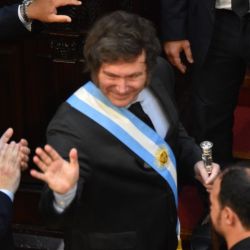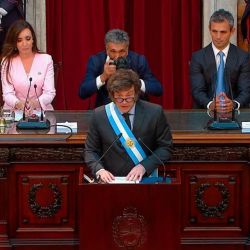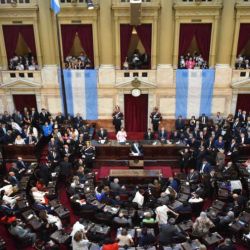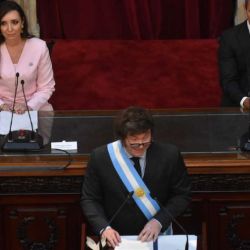President Javier Milei warned the nation’s lawmakers on Friday that his sweeping reforms for Argentina’s economy would be introduced “with or without the support of the political leadership.”
In his landmark state-of-the-nation address, and marking the opening of Congressional sessions, Milei also revealed that he would ask Argentina’s political class to sign up to a new 10-point “social contract” based on the liberal proposals he espouses.
The so-called "Pacto del 25 de Mayo" – which includes agreements on the “inviolable” right to private property, the importance of a “non-negotiable fiscal balance” and the need for labour reform – would reshape the nation in Milei’s image.
"Our convictions are unalterable. We are going to change the country for good... with or without the support of political leaders, with all the legal resources of the Executive," Milei told lawmakers, who have stalled his project of deregulation and budget cuts.
"If you look for conflict, you will have conflict," he warned, imploring Congress to approve his reform push.
"When we come up against an obstacle, we will not turn back, we will continue to accelerate," the president declared in comments that were cheered by his supporters in the chamber.
Milei offered a recap of his first 82 days in office, in which he introduced drastic spending cuts. His government has devalued the peso more than 50 percent, slashed state subsidies for fuel and public transport, cut tens of thousands of public service jobs and scrapped hundreds of rules in his bid to deregulate the economy.
"I ask for patience and trust," the president asked Argentines, who are suffering from 250 percent inflation.
"It will be some time before we can see the fruits of the economic reorganisation and the reforms we are implementing."
"We have not yet seen all the effects of the disaster we inherited, but we are convinced that we are on the right path, because for the first time in history we are attacking the problem by its cause: the fiscal deficit, and not by its symptoms," said the La Libertad Avanza leader.
‘Pacto de Mayo’
In the first part of his speech, Milei detailed the situation he inherited upon taking office and his austerity measures. He then dedicated himself to fierce criticism of Argentina’s “political caste,” directly attacking lawmakers, some of whom he accused of “enriching themselves" through politics.
There was a special mention of his Peronist presidential rival Sergio Massa, union leader Pablo Moyano, social activist and lawyer Juan Grabois and lawmaker Máximo Kirchner – the "horsemen of failure,” as Milei put it.
Former president Cristina Fernández de Kirchner was also name-checked as being “responsible for one of the worst governments in history,” added the far-right leader.
But after continuing with his aggressive criticism, the president changed tack, proposing a way out of the crisis. He said he would reach out to provincial governors, party leaders and former presidents to propose a "new social contract" for the country.
This would be based on 10 key principles, including a "non-negotiable" balanced budget, "inviolable" private property rights, a “modern labour reform” and public spending reduced to the "historic" level of 25 percent of Gross Domestic Product, he said.
He suggested the pact should be signed at a symbolic ceremony in Córdoba on May 25, the anniversary of the 1810 revolution, which led to Argentina's independence in 1816.
The location, he told reporters after his speech with a smile, was chosen because Conan – his dog who died in 2019 and whom Milei later had cloned – was from there.
Change is "non-negotiable," said Milei, vowing to "fulfil the promise we made to society."
New proposals
Moving onto his new proposals, the La Libertad Avanza leader confirmed that his government would completely close the Télam state news agency, an outlet he described as “Kirchnerite.”
The other policies of note were related to a "package of anti-caste laws" that Milei said would be sent to Congress.
Among them, the president promised to eliminate well-remunerated pensions for the president and vice-president of the nation, oblige unions to re-elect their authorities every four years (with limited re-election) and prioritise collective bargaining agreements agreed with workers over those negotiated by unions.
He will also seek a ban on individuals convicted of corruption with confirmed sentences to be banned from running for national electoral positions – a step applauded loudly by the chamber and which seemed to be aimed at Fernández de Kirchner, in particular.
Milei’s government will also deduct one day's salary for state employees who go on strike.
Controversially, the 53-year-old head of state also said he wants to eliminate all state financing for political parties. From now on, parties and candidates running for office will have to seek private financing.
Milei also said that Argentina’s head of state, economy minister and Central Bank governor should be penalised by law if they vote for a budget bill which contemplates the “financing of the fiscal deficit by printing money.”
In a comment that is sure to anger human rights campaigners in Argentina, the president said such behaviour ought to be “a crime against humanity."
‘Meat on the grill’
Pro-government lawmaker José Luis Espert praised the speech, saying it is good to “put all the meat on the grill" and for the president to fully outline his intentions.
Rivals were less keen. Left-wing lawmaker Myriam Bregman described it as "a smokescreen to avoid talking about reality.”
"Reaching May in these conditions is going to be very difficult," responded Córdoba Province Governor Martín Llaryora.
Former president Mauricio Macri said he and the party he co-founded would support Milei's proposals.
"President, PRO will be in Córdoba to sign the Pact of May 25," he wrote on X (formerly Twitter).
Iván Schuliaquer, a political scientist at the National University of San Martín, said that while Milei didn’t tell lawmakers explicitly he would govern by decree, he did threaten them.
"He proposes that the only popular will that counts is that which voted for him and not the governors or the deputies and senators," said the political analyst.
The expert considered that by proposing a political pact, Milei "sets a political horizon for three months from now, knowing that the economy of most people will be worse off” by then.
Milei himself said in an interview this week that the worst of the austerity would come “in March and April.”
“We will hit bottom and then bounce back,” he declared.
Reform push
Many of Milei’s proposed reforms have been challenged in court, with more than 60 lawsuits filed by labour unions, business chambers and NGOs. In recent weeks, labour and social unrest has grown, with large protests by citizens who fear Milei's plans will leave them poorer.
Faced with parliamentary reticence, Milei scrapped almost half of the initial 664 articles in the sweeping deregulatory ‘omnibus bill’ issued after he took office, then withdrew it altogether.
But the President has vowed to return his bill to Congress. And he has threatened to pass his reforms by presidential decree if lawmakers do not fall in line.
Argentina is grappling with severe economic struggles after decades of mismanagement driving poverty levels to nearly 60 percent and pushing inflation to an annual rate exceeding 250 percent.
Milei, a 53-year-old economist and political outsider, won last year’s presidential run-off on a wave of fury over a financial crisis marked by rampant money printing and fiscal deficit.
His government claims that some of Milei's changes are already bearing fruit: in January, Argentina reported its first monthly budget surplus in 12 years while boosting foreign currency reserves from US$21 billion to US$27 billion.
Rising poor
But as inflation continues to bite, the poorest have been hit the hardest. Milei is removing generous transport, gas and electricity subsidies and has frozen aid to 38,000 soup kitchens pending an audit, a move it justifies by its attack on “intermediaries” who previously supported those less well-off.
Milei insists Argentina has to swallow a bitter pill to rescue the economy, and has warned the population to brace themselves for things getting worse before they get better.
The speech took place at the unusual time of 9pm on a Friday night. Rebuffing the normal time, said Milei’s spokesperson, was a move to attract a larger audience.
A heavy security operation was deployed ahead of the speech. Hundreds of people – mostly from left-wing groups, social organisations and unions – demonstrated close to Congress in repudiation of the austerity measures.
"It turns my stomach," said Elba Sarmiento, a 37-year-old craftswoman at the Plaza del Congreso.
"What is happening is terrible. It's an extermination of the poor."
Key quotes and points from Milei’s speech
-
On the size of the state:
"We must reduce the size of the state to its indispensable minimum, and purge it of privileges for politicians and their friends."
"The last 20 years have been an orgy of public spending." -
On the “caste”:
The president attacked politicians, businessmen, journalists and trade unionists, saying they are part of a “rotten scheme.” He announced he would send a "package of anti-caste laws" to Congress. -
On the challenge he faces:
"I don't have parliamentary majorities or governors, but I know what to do and I have the conviction to do it.” -
On the state news agency:
"We are going to close down Télam, which was used as a Kirchnerite propaganda agency." -
On strikes in the education sector:
"Teachers' unions cannot be allowed to use students as hostages." -
On his “new social contract”
Milei called on provincial governors and former presidents to sign "a new social agreement" with him in Córdoba on May 25. -
On security policy:
"We have inaugurated a new doctrine of law and order. We have begun to enforce the law, without exceptions, and that is why we have freed the streets from the scourge of constant strikes.” -
On consumer prices:
"There are still a few months of high inflation" to go, he warned.
‘Pacto del 25 de Mayo’
-
The inviolability of private property.
-
Non-negotiable fiscal balance.
-
The reduction of public spending to historic levels, around 25 percent of Gross Domestic Product.
-
Tax reform to reduce the tax burden, simplify the lives of Argentines and promote trade.
-
Redistribution of federal taxes to put an end to the current extortionist model.
-
Commitment of the provinces to advance in the exploitation of the country's natural resources.
-
Modern labour reform to promote formal employment.
-
Pension reform that makes the system sustainable, respects those who have contributed and allows those who prefer to subscribe to a private pension system.
-
Structural political reform to modify the current system and realign the interests of the representatives with the represented.
-
An opening up to international trade, so that Argentina can once again become a global market player.
– TIMES/NA/PERFIL/AFP




























Comments